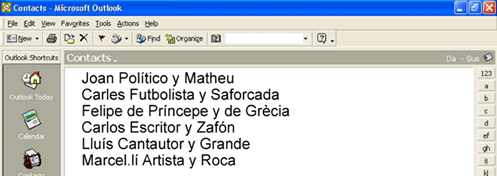27 Oct Who is really who

English Follows |Chinese Follows
Seth Godin propuso en su día fundar una escuela de negocios tremendamente rentable: no tenía ni locales, ni profesores, ni prácticamente ningún gasto fijo de mantenimiento. La escuela se basaba en dos principios. Primero, en tener un proceso de selección de alumnos tremendamente duro, de manera que los seleccionados serían muy probablemente reclutados por empresas de primer nivel sin necesidad de que los alumnos cursaran ninguna asignatura. Y segundo, la escuela reunía periódicamente a los antiguos alumnos (los que habían sido seleccionados; porque alumnos lo que se dice alumnos, en el sentido de haber asistido a alguna clase, ninguno) en actos sociales de networking, en los que se traficaba con proyectos e influencias. Por estas dos aportaciones, la escuela de negocios de Godin podía cobrar importantes cantidades a sus ?alumnos?. Obviamente, esta era una pequeña broma de Godin, pero cuando uno ve cómo funcionan finalmente las escuelas de negocios se pregunta si no sería una buena idea, al fin y al cabo.
Porque es cada vez más relevante contactar con personas a través de personas. Es crítico encontrar gente que no sólo tenga conocimientos, sino que tenga una determinada actitud, y esto último es muy difícil de valorar si no es desde la experiencia de proyectos compartidos. A mí me ocurre con mucha frecuencia: me piden contactos con personas que tengan no unas determinadas habilidades, sino una cierta actitud. Las redes sociales, que conectan a millones de personas entre sí, por enlaces generalmente débiles (en la terminología de la ciencia de redes: contactar conocidos más que familiares, que son enlaces fuertes), tienen esa finalidad: localizar talento, o conocer personas, con la garantía de un mediador. Porque lo importante no es saber quién es quién (who is who: los datos asépticos y fácilmente manipulables de tu curriculum) sino quién es realmente quién (who is really who: lo que dices y lo que no dices). (ver The World Technology Network).
El término en inglés para describir esta aportación de criterio sobre una persona es endorsement, y empieza a utilizarse con cierta frecuencia en el mundo de los recursos humanos.
Otra forma de entender esta cuestión es que a un país le conviene descubrir la gente que realmente hace las cosas, y no el establishment que acostumbra a secuestrar el estado de opinión de la comunidad. Hay gente que vive de cara a la galería (who is who), mientras que otros llevan las calderas del país (who is really who). Reconocer esta diferencia, y dar espacio de desarrollo a la gente de las calderas, es un acto de inteligencia colectiva del país. Así, por ejemplo, es hoy más fácil encontrar en la lista de las 500 personas más influyentes del país a políticos, periodistas y artistas, que a empresarios jóvenes o científicos, a los que deberíamos oír mucho más, porque son nuestro futuro.
Finalmente, será cada vez más vital que uno tenga cierto control sobre lo que se dice de él, especialmente en el mundo digital. O sea, habrá que buscar maneras, herramientas, para gestionar tu reputación online. (Ver las propuestas de ZoomInfo o de Ziggs)
Y, en otra dirección, habrá que pensar los perfiles personales a partir de perspectivas más amplias que tu mero curriculum vitae. Porque, más importante que decir lo que ?has estudiado? (algo hoy irrelevante) es explicar aquello ?en lo que tu mismo consideras que eres bueno?, a partir de la experiencia vital y profesional que hayas tenido (Ver, en este sentido, qué preguntas hacemos a los miembros de nuestra red de innovadores, Infonomía).
Una persona no es un título universitario.
English
Who is really who
Seth Godin once suggested setting up a highly profitable business school: it wouldn’t have any buildings, teachers or practically any fixed maintenance costs. This school would be based on two principles: Firstly, it would have an extremely tough selection process, so the selected students would almost certainly be recruited by top companies without having to study any subjects. Secondly, the school would regularly invite alumni (i.e. the former selected students, since they are hardly alumni in the strict sense of the word as they never had to go to a single class) back for networking events to deal in projects and influence. Thanks to these two features, Godin’s business school would be able to charge its ‘students’ considerable fees. Although this was clearly one of Godin’s little jokes, when you take a look at how business schools really do work, you begin to wonder how different fiction is from reality.
Because it is increasingly important to contact people through other people. It is vital to find people who have not only knowledge, but also a determined approach, which is very difficult to assess if you have no experience of shared projects. I frequently get asked for contacts for people not with specific skills, but a certain kind of approach. Social networks, which bring millions of people together through generally weak links (in the language of network science: contacts with acquaintances rather than relatives, with whom you have strong ties) serve this purpose: to locate talent, or meet people, through a guaranteed mediator. Because the important thing is not to know who’s who (the raw data which is easily fiddled on a CV), but who’s really who (what you say and don’t say) (see The World Technology Network).
Endorsement is the term used to describe providing these criteria about a person, and it is fast gaining ground in the world of human resources.
Another way of understanding this question is to realise that it’s a good idea to find out who really gets things done in a country, rather than thinking of the establishment, which usually tries to manipulate opinion. Some people might have a very public profile (who’s who), but it’s often others who actually keep the country going (who’s really who). Recognising this difference, and giving space to those who do the real work, is an act of collective intelligence for the country. For instance, nowadays on the list of the 500 most influential people in the country you’re more likely to find politicians, journalists and artists than young entrepreneurs or scientists, from whom we really ought to hear more, for they are our future.
Finally, it will become increasingly important to have a certain degree of control over what is said about us, especially in a digital world. We shall have to look for ways and tools to manage our online reputation. (See the suggestions from ZoomInfo and Ziggs).
And, in another direction, we shall have to think about personal profiles from a wider perspective than a mere CV. Because, more important than saying what you «studied» (today irrelevant) is explaining «what you think you’re good at», based on the life and professional experience you have had to date (Look at what kind of questions we ask members of our network of innovators, Infonomía).
A person is not a university degree.
Chinese
塞斯?戈丁(Seth Godin)曾提出过一个关于建立商业学院并能另其收益丰厚的设想:它不需要场地,不需要老师,事实上也不需要任何固定的维护费用。它的两大原则是:一, 使用一套非常严格的学生选拔程序,以使得最终被录取的人即使不修任何课程也有很大的可能性被世界一流的企业聘用;二,学院定期召集老生聚会(老生即那些被 录取的人??因为如果指那些上课的学生,这里可一个也没有),通过网络工作平台参加社会活动,在其中发布项目和展示影响。基于这两点创意,戈丁的商业学院 可以从它的?学生?那里获得丰厚的利润。当然,这只是戈丁的一个小玩笑,可如果人们看到最终商业学院是如何运作的话,或许就会自问,这到底还是一个好主意 呢吧。
通过中间人来聘用其他人,这是越来越显著的一个现象。因为重要的不仅是找到有知识的人、更要找到符合一定背景能力要求的人,而后者如果不通过合作参与项目 的经验显然非常难以考量。我经常碰到这样的情况:希望我推荐一些具备某种才干而非具体技能的人。那联系了上百万人的社会网,其状态总的来说是弱而不稳的 (使用社会关系学的定义:强而稳定的家庭关系网以外的人际联系),结果通常是:通过某个中间人来寻找人才和认识人。因为重要的不是知道谁是谁(who is who:那些触手可及的且极易通过简历进行修饰的个人基本资料),而是到底谁是谁(who is really who:那些你已说的和你所没说的) (The World Technology Network)。英文中使用endorsement(保证、赞同)这个词来描述中间人提供观点的这一作用,这一定义在人力资源领域已经开始越来越多的被使用。
另外一个理解本问题的方式是,一个国家真正需要的是做事的人,而非那些引导公众走势的表象。有些人靠名流露脸为生(谁是谁),但另一些人是在给国家烧锅炉 (到底谁是谁)。承认这一差别、并给那些烧锅炉的人留下更多发展空间,是一个国家集体智慧的体现。就比如,一个全国500名最有影响力的人物??政客、记 者、艺人??它的排行榜要比一个青年企业家、科学家的排行榜容易找到的多,然而正是这些企业家、科学家应当成为我们更多关注的对象,因为他们是我们的未 来。
最后,如今一个人要掌握别人对他的品头论足??特别那些在数码空间的评论??也是越来越重要了。也就是说,要开始寻找工具和方法来管理你的在线声誉(参见ZoomInfo 或者Ziggs 的建议)。
同时在另一方面,也要开始从更宽的视角考虑你的个人背景而非单纯一个个人简历了。因为,通过鲜活的经历和生动的职场经验展示?你认为自己在哪方面是优秀的?比罗列?你学过什么?要更为重要(参见我们向创新网会员所提的问题,Infonomía)。一个人可不是一纸大学文凭。



Sorry, the comment form is closed at this time.